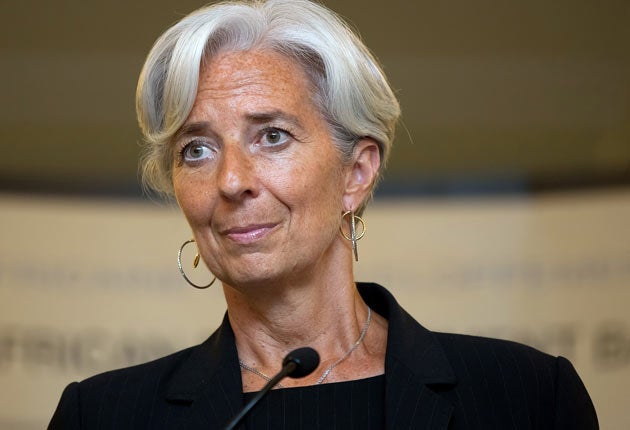Lagarde favourite to head IMF as nominations close

Your support helps us to tell the story
From reproductive rights to climate change to Big Tech, The Independent is on the ground when the story is developing. Whether it's investigating the financials of Elon Musk's pro-Trump PAC or producing our latest documentary, 'The A Word', which shines a light on the American women fighting for reproductive rights, we know how important it is to parse out the facts from the messaging.
At such a critical moment in US history, we need reporters on the ground. Your donation allows us to keep sending journalists to speak to both sides of the story.
The Independent is trusted by Americans across the entire political spectrum. And unlike many other quality news outlets, we choose not to lock Americans out of our reporting and analysis with paywalls. We believe quality journalism should be available to everyone, paid for by those who can afford it.
Your support makes all the difference.Christine Lagarde, the French finance minister, remained the favourite to be the next managing director of the IMF as nominations closed last night.
Rivals to succeed Dominique Strauss-Kahn have included the Mexican central bank chef Agustin Carstens, former South African finance minister Trevor Manuel, and Grigory Marchenko, chairman of the central bank of Kazakhstan.
Yesterday Mr Manuel ruled himself out: "It is important to understand that decisions take place in the context of world politics. Against that backdrop, I have decided not to avail myself".
The new appointment will be made on 30 June.
Ms Lagarde quickly emerged as a successor to Mr Strauss-Kahn after the news broke that he had been arrested on charges of sexual assault. She has gained wide support among European governments, including the UK, and has visited China and India to try to widen her backing among the fast-growing emerging economies. The signs are that she has succeeded in doing so.
By convention, the top job at the IMF is reserved for a European candidate, with the presidency of the World Bank going to an American. However, in recent years there have been calls to end that practice, and open the role to someone from the rest of the world. Despite some recent reforms, though, the US and Europe command the bulk of the voting rights at the fund, and are demonstrably keen on securing the job for Ms Lagarde.
The IMF's 24 strong executive committee, which will shortlist and choose the candidates on behalf of the Fund as a whole, is also dominated by the established advanced economies.
On policy, allies of Ms Lagarde argue that she has the contacts and knowledge to deal with the most pressing issue facing the fund, the sovereign debt crises in the eurozone. Critics claim that the European crisis requires a fresh, objective set of eyes.
If Ms Lagarde does make it she will be the first female head of the IMF and the fourth French one.
A French court has put off until 8 July a decision on whether to open an inquiry into allegations Lagarde abused her authority in approving a payout to Bernard Tapie, a businessman. She has denied any misconduct.
Join our commenting forum
Join thought-provoking conversations, follow other Independent readers and see their replies
Comments